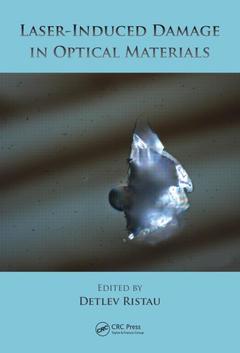Laser-Induced Damage in Optical Materials
Coordonnateur : Ristau Detlev

Dedicated to users and developers of high-powered systems, Laser-Induced Damage in Optical Materials focuses on the research field of laser-induced damage and explores the significant and steady growth of applications for high-power lasers in the academic, industrial, and military arenas. Written by renowned experts in the field, this book concentrates on the major topics of laser-induced damage in optical materials and most specifically addresses research in laser damage that occurs in the bulk and on the surface or the coating of optical components. It considers key issues in the field of high-power laser coatings, factoring in the effects of contamination and providing insight into typical application areas.
Become Familiar with the Key Areas of Modern Photonics
The text first provides a basic understanding of theoretical and experimental methods and then summarizes the current progress, strategies, and improvements occurring within the field of laser-induced damage. Divided into four sections, this book outlines apparent trends in modeling, and discusses measurement and evaluation techniques for laser damage thresholds in the context of international standardization and scaling laws for damage thresholds.
This seminal work:
- Covers the major aspects of laser damage
- Considers all important aspects in industry and research
- Reviews laser damage effects in material and surfaces
- Contains chapters contributed by leading scientists in the field
Laser-Induced Damage in Optical Materials
Section I Fundamentals. Laser-Induced Damage Phenomena in Optics: A Historical Overview. Laser-Induced Damage by Thermal Effects. Defect-Induced Damage. Self-Focusing and Nonlinear Effects. Femtosecond Laser-Induced Damage in Dielectric Materials. Section II Measurements. Measurement and Detection of Laser-Induced Damage. Statistics of Laser Damage Threshold Measurements. Measurement of Light Scattering, Transmittance, and Reflectance. Section III Materials, Surfaces, Thin Films, and Contamination. Quartz and Glasses. Crystalline Materials for UV Applications. Materials for Lasers: Frequency Conversion, Q-Switching, and Active Materials. Surface Manufacturing and Treatment. Introduction to Optical Coatings and Thin Film Production. High-Power Coatings for NIR Lasers. Coatings for fs Lasers. Spaceborne Applications. Section IV Applications. Lithography in the Deep Ultraviolet and Extreme Ultraviolet. Free-Electron Lasers. The High-Energy Petawatt Laser PHELIX and its High-Power Optics. Index.
Detlev Ristau completed his study of physics at the University of Hannover in 1982 and was awarded a scholarship at Rice University in Houston, Texas. He returned to Germany in 1983 and received his PhD at the University of Hannover in 1988. He is presently the director of the Department of Laser Components at the Laser Zentrum Hannover. After receiving a state doctorate in 2008, he was appointed professor for applied physics at the Leibniz University in Hannover in 2010. Professor Ristau is the author or coauthor of more than 300 technical papers and has published several book chapters.
Date de parution : 12-2014
17.8x25.4 cm
Date de parution : 11-2016
17.8x25.4 cm
Thèmes de Laser-Induced Damage in Optical Materials :
Mots-clés :
Ch Ap; Laser Damage; Damage Threshold; High power lasers; Laser; Induced Damage Thresholds; Optical coatings; Fused Silica; Damage mechanisms; Antireection Coatings; Optical materials; Electric Eld; Free-Electron Lasers; Energy Density; The High-Energy Petawatt Laser; Multiphoton Ionization; PHELIX; Laser Damage Resistance; Lithography; Laser Damage Threshold; NI R Lasers; KDP Crystal; Q-Switching; CB Electron; Femtosecond Laser-Induced Damage; Ionization Rate; Dielectric Materials; Damage Precursors; Hr; Damage Sites; Quarter Wave Stack; FEL; Laser Resistance; High Refractive Index Layer; Surface Relief Gratings; Electron Hole Plasma; High Refractive Index Material; Ns Pulse Duration



